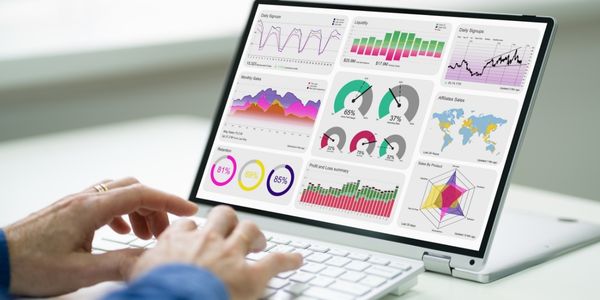
You probably already know some of the main reasons people get into data analytics. The market is hot, job opportunity is vast, and it seems like pretty much every organization worldwide is looking for data analysis.
But as much as you love some solid data points about job growth and salary (and if you want to become an analyst there's a good chance you do love a data point), you want to know more about this career path as a whole.
What is it like to work as a data professional? Is data analyst the only job title out there? Are there any major drawbacks to working in data analytics? Basically—what do you need to know before you commit time and effort to this field?
We asked data analytics professors to share their thoughts on why data analytics jobs are worth pursuing to help you decide if you are a good candidate for this kind of role.
Data analytics is a good career because...
1. Data science is easier to understand than, say, computer science
In data analytics, technical skills are prized and often necessary. But the roles in data analytics are also broad enough to give you room to gravitate toward the quantitative work, technical work or work that focuses more on explaining, visualizing and communicating findings.
If you like computer programming, focusing on data science will give you the deepest exposure to that side of things. But if you're less interested in programming or aren't especially into heavy math, don't worry, data analysts usually do far more critical thinking than computing.
"We used to do things manually, with calculators," laughs Asia Anuwa, Data Analytics Instructor at Rasmussen University. "But when it comes to data analytics today—we're talking about thousands, sometimes millions of data. The volume we have to deal with is mind-boggling."
Thankfully, the technology in data analytics has been trying to keep pace with that need. So the field today is less about calculation or statistics and more about problem-solving, critical thinking and communication, according to Anuwa. Though an affinity for math or programming will certainly help, don't be worried if it isn't your jam.
"When students don’t have a strong math background, I break the topics into smaller units to help them comprehend each aspect at a time," Anuwa says. "It's more important to understand the larger picture of what we are actually doing. The calculation will be done by software."
Anuwa's approach of teaching smaller units and the understanding that they primarily need to just grasp the foundations, can make a big difference for students who aren't in this for the math.
"It’s very doable," Anuwa says. Even though data analytics and data science seem intense or complicated from the outside, learning things one step at a time in a good data analytics program makes all the difference.
"After all, this knowledge was all invented by human beings," Anuwa says. "If someone can invent it—you can study it and apply it. Don't be anxious about that."
2. If you like puzzles, the work will be fun
Much of the training you'd get in a data analytics program is around scenarios where you have to find answers or results from real life data sets. Sometimes you'll do this from scratch, gathering data yourself—and sometimes you'll have data to work with and will follow a process to find what you need.
"I find it very interesting, in real life, that good data professionals will keep changing their models, making adjustments based on what clients need," says Kevin Watts, Data Analytics Lead at Rasmussen University.
A data analytics consultant might meet with clients, for example, and listen to things they'd like to know right at the start. "You might have a general approach, but when you understand what their needs are—you go back to the drawing board," Watts says. He especially enjoys finding efficiencies in how he works with data, making it faster and more reliable each time.
But unlike some careers in the world of technology, the data analyst role rewards creative, out-of-the box thinkers. Because sometimes the best way to solve a problem is to start from a totally new premise.
3. Data is very worldwide
Careers that can transcend national barriers are appealing not only for the possibility of being able to find work somewhere else—but also for the expanded job market.
Skilled data analysts are useful to pretty much every organization large enough to have data. "I believe strongly that by the time my data analytics students leave class, they should be competitive internationally," Anuwa says.
"The world is dynamic and is changing rapidly—so many companies they are using data, and everything is getting digitalized," he adds. That's not restricted to a certain locality. Having a skillset that is valued globally will only add more options to your data analyst career.
4. You can speak with authority in this role
In the old days, business leaders made decisions based on a mix of intuition, experience and general biases or preferences. Afterall, the upstart with the bright idea who gets quashed by leadership because this is the way we’ve always done things is a tale as old as time.
But in a data analytics career, your job is basically to figure out the truth. By the time you present an insight to your manager or a client or company leadership, it won't just be a good idea—it will be backed by extensive evidence.
"Data analytics has a lot to do with critical thinking and your ability to communicate what you have discovered," Anuwa says. "When you analyze your data, you'll see patterns, traits, correlations." Anuwa says finding one of those patterns or correlations gives a rush of satisfaction.
"When you talk, you can talk authoritatively because you know there is evidence for what you are saying."
5. Data analysis skills are highly transferrable
A data analytics career involves a ton of transferable skills, according to Anuwa. "Sometimes students come into my courses with a misconception that it's about crunching numbers or statistics—but it goes far beyond that."
Take communication for example. Anuwa says the skill to communicate insights and the data analytics process to people outside your area of expertise is highly valued in data analysts.
"Most of the people you will share insights with are not in your field, so how do you explain? If you are not a good communicator, that would be a big hindrance," Anuwa says.
Communication, problem-solving and critical thinking are some of the core competencies students in Rasmussen's data analytics programs work on, along with the technical skills in data analytics tools, programming languages and a foundational understanding of the field.
"All of these skills are very transferable," Anuwa says. "If you don't like your data analysis role, there are numerous different careers right now that need similar services. You can easily move to another area."
For example, Anuwa says a data analyst could find opportunity in data manipulation, data visualization, finance, healthcare, marketing, banking... "There will be a space for you in those industries, they welcome people with this skillset."
6. You will also gain practice with objectivity
In a class he is teaching right now, Watts is talking about ethics and bias in data.
"Let's say someone wanted to intentionally manipulate data to show their sales point of view," Watts says. "They can use data to do that. They can change the scales on a graph to make a difference seem smaller or larger, they can carry bias into the sampling or cherry-pick data points. We train data analysts to look for that kind of manipulation."
An ethical data analyst will be prepared to watch out for confirmation bias, sampling and reporting biases and so much more. Watts points out that it can be harder than you might think, since most biases are very subconscious.
In confirmation bias, Watts explains, you already have a preconceived notion, and you want that to be correct. So, as you analyze data, you may be choosing certain things and overlooking others to strengthen your argument. It takes intentional effort for data analysts to gather, analyze and report on data as objectively as possible.
"We train students to look out for these things and to present data accurately for customers," Watts says.
7. Data analyst jobs are growing at a rapid rate
This point in favor of a data analyst career is probably no surprise to you. According to the Bureau of Labor Statistics, data scientists are projected to see a 36% rise in employment growth between 2021 and 2031. Other data roles like market research analyst are projected to see a growth rate of 13%.1
For comparison, the average growth rate for all occupations is 3%.
"Data analysis is one of the hottest jobs," Anuwa says. He says the reason for this is how quickly companies are coming to appreciate the possibilities from data. "Instead of having one data analyst, they are integrating data analysts into different parts of their departments."
8. Roles in data are getting more interesting, too
As the general uptick in need for data analysis happens, there's also an outward expansion of the types of roles a data scientist or data analyst could move into. Data is so huge that professionals are needed in many different aspects of the work.
Data management could be an entire career path for someone. Getting super powerful at structured query language (SQL) could be another.
Maybe you want to make complex statistical models or build an AI tool that can refine raw data with speed and efficiency. Maybe you want to hone in on the presentation of things and the tail end of data insights—how a company can really use data to its best advantage.
"The opportunities are limitless," Anuwa says. "It's a field that is expanding everyday, and I would encourage everyone to take advantage of it."
How hard is it to become a data analyst?
If these insights into data analyst roles have you excited, maybe one of the career paths in data will be right up your alley.
Whether you are starting with a high school diploma or a degree in an entirely different field, becoming a data analyst is simpler than you might think! Check out "How to Become a Data Analyst" to see the steps you'd take.
1Bureau of Labor Statistics, U.S. Department of Labor, Occupational Outlook Handbook, Market Research Analysts, (accessed May 2024), Market Research Analysts : Occupational Outlook Handbook: : U.S. Bureau of Labor Statistics (bls.gov)




